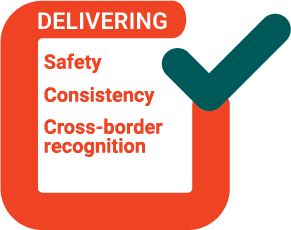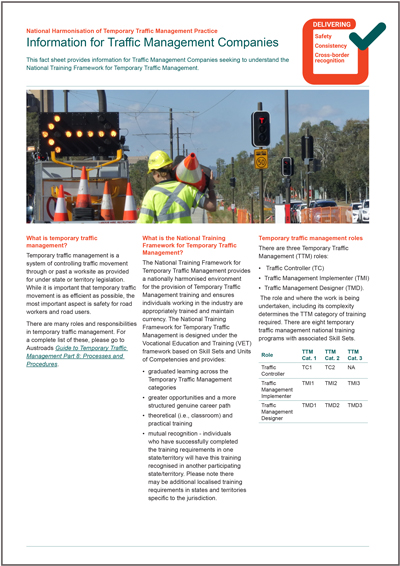National Training Framework for Temporary Traffic Management
The National Training Framework for Temporary Traffic Management ensures individuals working in the industry are appropriately trained and that their knowledge and skills are maintained.
The National Training Framework is designed under the Vocational Education and Training (VET) framework based on Skill Sets and Units of Competencies and provides:
- graduated learning across Temporary Traffic Management categories
- greater opportunities and a more structured genuine career path
- theoretical (classroom) and practical training
- national recognition - individuals who have successfully completed the training requirements in one state/territory will have this training recognised in another participating state/territory. Please note there may be additional localised training requirements in states and territories specific to the jurisdiction.
The pages in this section cover training requirements and the RTO Operational Framework.
Frequently asked questions
There are three Temporary Traffic Management (TTM) roles:
- Traffic Controller (TC)
- Traffic Management Implementer (TMI)
- Traffic Management Designer (TMD).
The role and where the work is being undertaken, including its complexity determines the TTM category of training required. There are eight temporary traffic management national training programs with associated Skill Sets.
- Traffic management workers will receive high quality training and understanding of how to comply to the current standards and regulations.
- Traffic management workers will have a clear career pathway and opportunities to up skill.
- Nationally recognised skill sets create a flexible and agile workforce that can work in any participating jurisdiction across Australia (following the completion of any additional state or territory localised training).
An Approved Training Provider (ATP) is a Registered Training Organisation (RTO) that has been approved by a State or Territory regulator to deliver Temporary Traffic Management training under the National Training Framework for Temporary Traffic Management
An RTO cannot provide training under the National Training Framework for Temporary Traffic Management without becoming an ATP in the state or territory it wishes to deliver training in.
Being approved as an ATP in one state or territory does not automatically entitle an RTO to provide Temporary Traffic Management training in another state or territory.
Following successful completion of theoretical (inclass/face-to-face) training, learners will be required to complete practical learning experience. This practical experience will also require the completion of a final assessment (assessed by the Approved Training Provider). The practical component aims to ensure that individuals have the opportunity to gain sufficient practical experience before working independently.
Traffic Management Companies may consider partnering with Approved Training Providers to provide the practical supervision of the training courses. It is important to note that only Approved Training Providers can provide training in Temporary Traffic Management. Approved Training Providers will be listed on the Austroads website and are authorised to use the approved training provider logo.
Individuals who have successfully completed the training requirements in one state/territory will have this training recognised in another participating state/ territory. Please note there may be additional localised training requirements in states and territories specific to the jurisdiction. This may be referred to as gap training and ensures an understanding of subtle differences in legislation and signage within a state or territory.
Austroads and jurisdictions recognise that arrangements need to be put into place to manage the consideration and transition of individuals from the current training system to the new National Training Framework.
A key consideration will be to ensure minimal disruption to the individual, employer, and workplace.
Transitional arrangements are decided by individual jurisdictions in consultation with industry and are publicly announced.
The renewal date will be that of the 3-year anniversary of the issuance of the Statement of Attainment. To maintain currency, refresher training must be undertaken prior to the renewal date.
To be eligible to complete a refresher course you must meet the following criteria:
- Your training date must not have expired (for example, if your training was completed on 1 January 2023, your training expiry date will be 1 January 2026).
- You hold the skill sets for the refresher training you wish to complete (for example, to complete the refresher course for Traffic Controller 1 you must hold the current skill sets for Traffic Controller 1).
- You can demonstrate you have industry currency.
Updated 09 June 2023.


